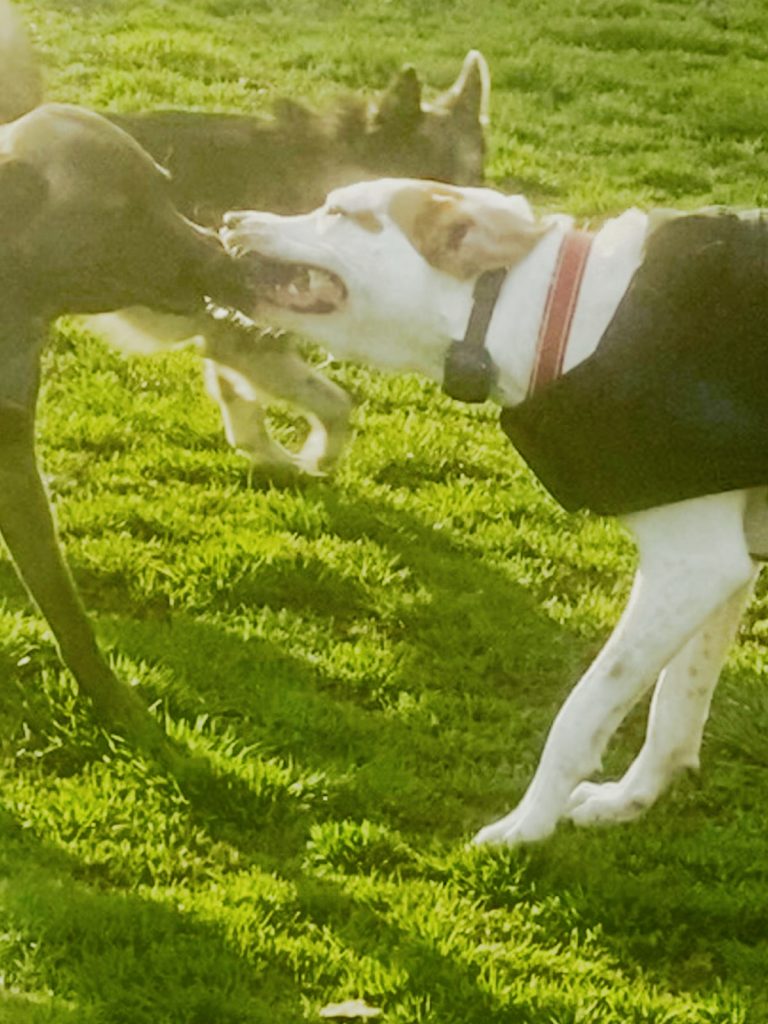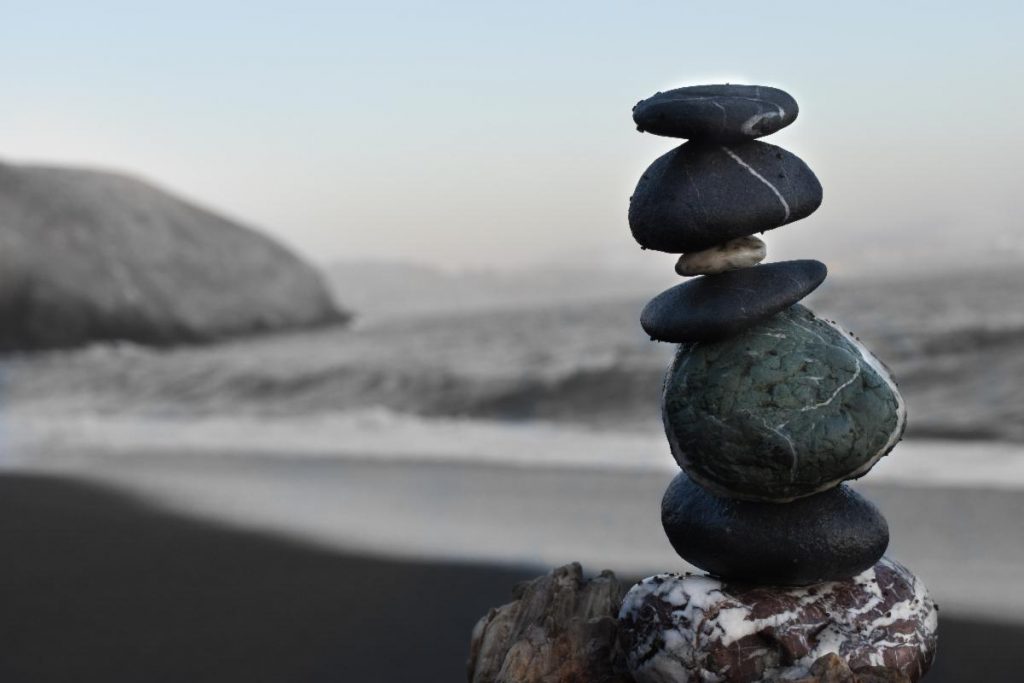Nearly 3,000 years ago, Heraclitus taught us that “Character is destiny.”
More and more, life has taught me how true this is.
And nowhere do I see it more clearly demonstrated than each morning on the baseball field.
Of course, I’m not really talking about the humans.
Instead, I’m much more interested in how each canine personality reveals itself in the choices they make, particularly when it comes to the backpack of squeaky balls I bring each day.

The wonderful Madeleine L’Engle wrote that “It is the ability to choose which makes us human,” yet I would argue this extends to man’s best friend as well.
Miku the Weimaraner is perhaps the most easy-going, willing to play with any ball offered.
Moon is the most specific: basically, he wants whatever ball Vlad has.
(So do Cosmo and Dewey, except they’re more interested in the acquisition than in playing Fetch afterwards.)
Vlad and Chase’s choices are the most mysterious, however, perhaps even unknowable.
A particular ball will be the most sought after, only to be dismissed completely moments later.
The basis for their passionate preferences eludes me entirely.
There is no pattern I can detect regarding color, size, texture, previous playmate, or even the all-important squeak factor.
What is most significant, however, is that consistent with the philosophy of Essentialism ––the book I’m exploring this month–– they are making powerful choices.
Even if sometimes, as with Sun Bear, a new puppy friend, that choice is an intense, five minute tug of war with Vlad that ends in a standoff.

(Note: Cosmo opportunistically waiting in the background.)
Speaking of strong choices.
There’s one poem that’s almost certainly the one most used as inspiration for making bold, original, non-conformist choices.
Robin Williams evenquotes it inDead Poet’s Society when teaching his students to find their own way rather than just following into step with others.
And yet that’s perhaps not quite what Robert Frost meant in his masterwork The Road Not Taken.
Frost even said that it was “a tricky poem––very tricky.”
He composed it about his friend the poet Edward Thomas, initially to tease his tremendously indecisivewalking buddy.
Here are the first three of its four famous stanzas:
Two roads diverged in a yellow wood,
And sorry I could not travel both
And be one traveler, long I stood
And looked down one as far as I could
To where it bent in the undergrowth;
Then took the other, as just as fair,
And having perhaps the better claim,
Because it was grassy and wanted wear;
Though as for that the passing there
Had worn them really about the same,
And both that morning equally lay
In leaves no step had trodden black.
Oh, I kept the first for another day!
Yet knowing how way leads on to way,
I doubted if I should ever come back.

Again, the theme of this month’s new meditation HERE is Clarity.
Clarity can only come, however, through making choices.
The result of any choice––whether it involves one’s career, relationship, or which path to take in a yellow wood––is that there’s always a trade-off involved.
(Note: Cosmo did succeed in picking up two small balls simultaneously this morning, but I’m going to treat that as a unique cosmic anomaly, and one that he could only sustain for three brief seconds.)
Beyond just facing life’s trade-offs, I fear choosing is becoming more difficult for all of us.
We live in an age of not only information overload but also an equally exhausting opinion overload.
Nonetheless, we must to learn to choose, Essentialism points out, or invariably someone else will choose for us.
Either way, each choice we make means that we will both gain and lose something.
That’s why clarity around what we most deeply want and need is absolutely imperative.

I’ve often found the classic time management analogy of Rocks, Pebbles, and Sand extremely helpful.
A professor fills a jar with rocks, asking his students if it’s full.
They agree and then he adds pebbles to the jar.
He asks his class again if the jar is now full, and they once again confirm that it is.
Finally he pours sand into the jar, filling it completely.
The lesson, he tells his class, is that this only works if you start with the rocks.
If you begin with the sand, you’d never get the rocks or even the pebbles to fit.
The rocks represent the most important areas of our lives: health, family, and deep connections with friends.
The pebbles are secondary concerns that definitely matter––work, school, and other achievements––but not as much.
The sand represents the more superficial elements of our lives, the diversions and distractions.
The key realization is that the jar, like our lives, is finite.
Whether it’s Rocks, Pebbles, or Sand––or Career vs. School Plays…it’s comforting (and unnerving) that it’s entirely up to us how we fill it.

In the 13th century, Rumi made this same kind of MBA time-management point but even more simply.
In his poemThe One Thing, he tells us:
There is one thing in this world you must never forget to do.
If you forget everything else
and not this,
there’s nothing to worry about,
but if you remember everything else and forget this,
then you will have done nothing in your life.
Alas, even though fulfilling it is all that’s essential, Rumi never tells us exactly what that one thing is.
Indeed, we all know the experience of going to the store and returning home with everything except the item you went out for in the first place.
Unfortunately, we can live our entire lives that way, whether that’s forgetting the loaf of bread we set out for, or realizing too late we were really meant to be a musician all along and not a plumber.

Here’s how Frost ends his poem:
I shall be telling this with a sigh
Somewhere ages and ages hence:
Two roads diverged in a wood, and I—
I took the one less traveled by,
And that has made all the difference.
The ultimate meaning rest largely onhow you interpret the poet’s sigh.
Is it one of regret or satisfaction?
Remembering that Frost wrote the poem as a gentle taunt to his indecisive friend, it’s also worth noting he also said, “I’m never more serious than when joking.”
Here’s my interpretation.
I think the sigh is one of both satisfaction AND regret, the fair price of every well-made choice.
Yes there are trade-offs involved but, as Greg McKeown, the author of Essentialism writes the wise, rather than focusing on the question ‘What do I have to give up?’” instead ponder “What do I want to go big on?”
Or as rephrased by the greatMary Oliver:
“Tell me, what is it you plan to do
with your one wild and precious life?”
Miku, Moon, Cosmo, Dewey, and Vlad et. al. know the answer to this question deep within their bones.
As I dive deeper into this month’s exploration of Clarity, an ongoing adventure that I’m eager to share with you, I’m wishing the same for all of us.
Namaste for Now,

